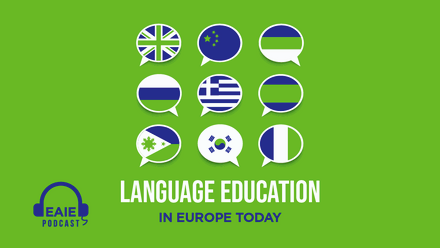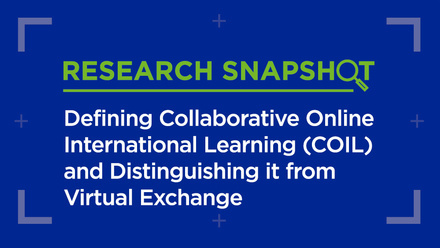Intercomprehension: a linguistic bridge to intercultural understanding

Depending on your perspective, multilingual education is either an integral aspect of internationalisation itself, or an often-overlapping sister discipline to international education. In recognition of this year’s International Mother Language Day, representatives of the UNITA European University alliance reflect on ‘intercomprehension’ as a core component of education at the cooperation between the institutions it comprises, and how promoting the use of students’ mother languages can boost rather than impede international experience and intercultural understanding.
UNITA - Universitas Montium is one of the alliances supported by the European Commission under the European Universities Initiative, with the aim of generating systemic changes in the areas of European higher education and research, by designing new forms of international cooperation between universities across Europe. A key element connecting this alliance is the fact that the languages spoken in it are all within the Romance family of languages and that it encourages multilingualism.
UNITA identified a possible linguistic obstacle in the internationalisation process within the alliance and turned it into a tool for enhancing it
The six founding universities of the Alliance are:
- Universitatea de Vest din Timișoara (Romania)
- Università degli studi di Torino (Italy)
- Université de Pau et des Pays de l'Adour (France)
- Université Savoie Mont Blanc (France)
- Universidad de Zaragoza (Spain )
- Universidade Beira Interior (Portugal)
In 2022 UNITA extended its dimensions through its new University Associated Partners:
- Università degli Studi di Brescia
- Transylvania University of Braşov
- Public University of Navarra
- Polytechnic of Guarda
- HES-SO - Haute Ecole Spécialisée de Suisse occidentale
- Yuriy Fedkovych Chernivtsi National University
What is intercomprehension?
Vorbești limba română?
No, hablo español.
Falar muito bem portugues?
Non, je parle français.
Capisco tutte queste lingue e anche italiano – using intercomprehension!
What is this all about? Does it make any sense? Well, in fact, it does! It is actually possible to be understood in different languages which are related to your own – otherwise known as ‘intercomprehension’. In this example, Romanian, Italian, French, Spanish, Portuguese and many others have the same linguistic roots in the Latin language.
Intercomprehension fosters dialogue between speakers of related languages
Intercomprehension is a form of communication in which each person uses his or her own language and understands that of the other, without necessarily having learnt it before. It refers to a communicative context in which speakers within the same language family can understand each other with relative ease. By speaking your native language you make yourself understood by the interlocutor who replies to you in his or her own language. Using verbal and non-verbal communication strategies, each expressing themselves in their own language, speakers can carry on a dialogue.
As such, intercomprehension fosters dialogue between speakers of related languages. The universities in the UNITA alliance share a common linguistic background in the Romance languages, but the same principle can be applied to speakers of different Germanic languages, Slavic languages, or other language families with a degree of mutual intelligibility.
International student experiences via intercomprehension
Students are at the very core of the UNITA alliance and they have a variety of options to practice intercomprehension either in a formal manner or in an informal one. Moreover, they are encouraged to do so as a means to support their personal and professional development in a European University.
In terms of formal opportunities, university partners organise a series of monthly thematic events around intercomprehension known as ‘Cafenele lingvistice’, a common friendly space for students where they are guided by teachers in the field of intercomprehension and UCIL (the Romance acronym for COIL) courses of intercomprehension where their work is acknowledged and rewarded. Using strategies based on the principles of intercomprehension, participants are trained to adopt reflexive and strategic thinking that uses the linguistic competence they already have in order to understand the languages spoken or written by others. These events are not only targeting students but also academic and administrative staff.
Informally, students practice intercomprehension without even knowing it just by being part of UNITA as a comprehensive alliance of universities, especially when participating in one of the various mobility options. Whether students choose virtual mobility, blended intensive programmes or rural mobility, they are 100% engaged in speaking their mother tongue and being understood while others around them do the same.
UNITA Rural Mobility is an innovative form of international mobility that offers internship opportunities for students promoted by our alliance. Through training internships for university students in cross-border rural and mountain areas, UNITA Rural Mobility aims to push motivated and talented people to learn more about local innovation, to build local development strategies based on sustainable growth objectives, to promote the repopulation of smaller centres and to encourage new employment opportunities – all while practicing intercomprehension, of course. These rural communities interact with the students throughout their entire three-week stay, preparing local dishes and bringing them to the students three times a day. Through participating in community-based activities, students and local communities alike have the opportunity to use intercomprehension.
Additionally, university students are not the only ones who become familiarised with intercomprehension through UNITA. UNITA Junior Academy, a space designated to young learners ranging in ages from 10 to 18 years who study in partner countries, offers activities for schools like treasure hunts, sketches, creative workshops and interactive games which introduce intercomprehension to them.
Intercomprehension and internationalisation
With the ultimate purpose of creating a multicultural, multilingual, innovative and sustainable student-centred space in the European higher education area, UNITA identified a possible linguistic obstacle in the internationalisation process within the alliance and turned it into a tool for enhancing it. Although intercomprehension, with its emphasis on students using their own language rather than learning another, might seem counterintuitive in regards to internationalisation, in the long term it supports student, staff and academic communities’ interest and involvement in international mobility, as well as fostering an appetite for learning a different language. In that way, intercomprehension serves as a tool for diversifying and multiplying unique international experiences for the members of our community.
Happy International Mother Tongue day from Romance language-speaking Alliance, UNITA-Universitas Montium!






